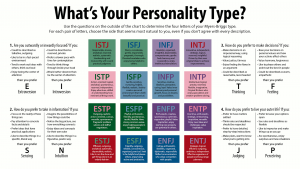21 Finding a Career Path
Jenna Perlow; Sarkis Hermez; Natalia Acevedo; and Donovan Oneal
Outline Your Career Goals
When beginning your journey to finding a career path, you must first outline your career goals. Having set goals can help you know you are on the right track, whether it be the amount of money you make or the experiences you have with the job. A few examples of career goals are to increase knowledge, increase earnings, be more active in the workplace, or obtain a higher position. These are just a few of the nonspecific ones, but they are your personal goals and you can customize them to your interest.
When designing your career goals you also have to make sure you will be motivated to fulfill them. Your motivation to achieve your goals can either be intrinsic, extrinsic, or both.
 Intrinsic motivation brings personal satisfaction. You are motivated because you are bettering yourself. Extrinsic motivation is to receive something from others. You are motivated through a reward or punishment. Motivation plays a huge role in your career path, without it we lose satisfaction and commitment to our career.
Intrinsic motivation brings personal satisfaction. You are motivated because you are bettering yourself. Extrinsic motivation is to receive something from others. You are motivated through a reward or punishment. Motivation plays a huge role in your career path, without it we lose satisfaction and commitment to our career.
There are many different goals to set for yourself, they can be big or small and should be personal to you. Your goals should cater to your personality, values, and interests. Depending on your personality it may be harder to achieve some goals over others so make sure you set challenging goals that are in your comfort zone. Values also come into play when setting goals because you have to make sure you are not bending your beliefs to accomplish your goals. Finally, make sure you are interested in your goals, if you are not interested in them then either it should not be a goal or you are heading in the wrong direction.
Discovering Your Personality

Picking a career is a major part of everyone’s life. Personality plays a huge factor in deciding what career is right for each individual‘s lifestyle. A lot of studies have shown that people who hold characteristics and tasks related to their personalities are more productive, happier, and more successful. People shouldn’t waste their time and money going into a career that makes them feel unhappy and unmotivated to go into their job every day. For example, extroverts tend to usually work in a job involving communication and sales. On the other hand, introverts usually stick to working in environments with computers and technology. If an extrovert was to have an office job sitting behind a computer all day, they wouldn’t be as motivated or as productive, because they are so unsatisfied with their environment and their career. Whether we’re choosing a job, a partner, or even a home, our personalities lead people in the right direction and shape the paths that our lives take. There are four reasons why your personality should fit your career: better culture fit, better job performance, higher job satisfaction, and it’s easier to identify your strengths and weaknesses. You can find out a lot about your personality by simply doing self-reflection, taking personality tests, and understanding what different personality traits mean. A helpful resource in finding the appropriate career for your personality is the Myers-Briggs Type Indicator. It’s a test on how people perceive the world and make decisions. Knowing your personality type can give you important information about yourself, like what motivates you the most or when you’re most efficient and productive.
Identifying Your Core Values
When it comes to finding a career, many pay attention to the amount of money they will make. Neglecting how their job can make them truly feel. Although money is a strong motivation, you will not feel true fulfillment out of money. To feel fulfilled in a work environment, you have to do what makes you happy. This means taking a look at your core values. Core Values are the fundamental beliefs of a person. Thus, these principles dictate our behavior and can help us decipher between right and wrong. When you define your personal values, you discover what’s truly important to you. You can find what is important to you in a few, easy steps: 1. Write down your values 2. Consider the people you most admire 3. Consider your experiences 4. Categorize values into related groups 5. Identify the central theme 6. Choose your top core values. Your values can be a few simple words such as growth, intelligence, friendship, teamwork, happiness, etc. It is best to find a career path that fits your criteria. If we overlook these values, our mental, emotional, and physical state can be put at risk.
Taking Note of Your Interests
This step varies widely from person to person. You most likely will have various interests that simultaneously provide you with contrasting career options. Investigate your past volunteer experiences, favorite pastimes as well as any other interests that can help you identify specific fields or specialties that you enjoy. A common exercise people practice to help with their personal career search consists of constructing a list of ventures, hobbies, projects, and/or occupations that you enjoy. This may help you focus on specific careers within your search.
Now that you have examined your hobbies, interests, and pastimes as well as created a list of such things you may begin your job search. It is recommended that you first look for “seasonal” or “short-term” positions and opportunities when exploring new occupations. Remember that volunteering is another great way to explore new career paths. Your unmediated encounters and experiences will help you recognize the field or occupation that best suits you. If you happen to be a student or are currently employed, consider taking certification or a course that is required by one of your fields of interest. Participation in such activities will help you determine whether the career is one that you would enjoy or not.
Keep in mind that finding out what you don’t enjoy is just as productive as finding out what you do. Discovering that one or more of your fields of interest is not best suited for you is most certainly not a setback, but instead a step forward. Do not be afraid to put yourself out there and get involved.
Conclusion
In conclusion, when finding the right career path, you need to outline your career goals, discover your personality, identify your core values, and take note of your interests. Doing so will help you achieve more satisfaction within your career and live a happier life. Finding the right career path for yourself is a huge decision to make and there are many resources to help when deciding on different pathways.
Community Resources
Career Services Center: https://www.paradisevalley.edu/students/career-services
Degrees and Certificates: https://www.paradisevalley.edu/degrees-certificates
Employer Connections and Resources: https://www.paradisevalley.edu/students/career-services/employers
Media Attributions
- board, school, training, career, talent, vision, target, education, options, skills © pxfuel is licensed under a CC0 (Creative Commons Zero) license
- IMG_5708 © Jake Beech is licensed under a CC BY-SA (Attribution ShareAlike) license

